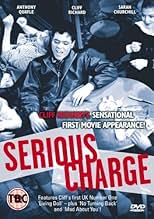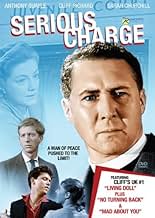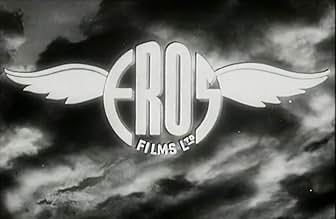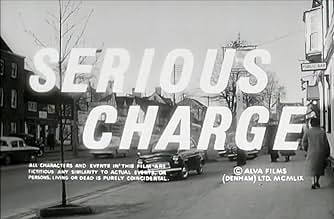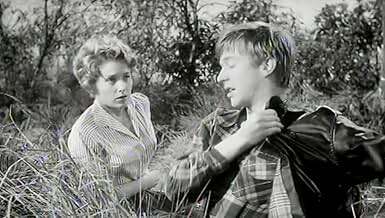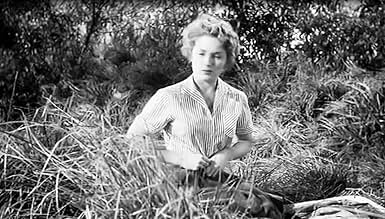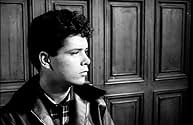Ajouter une intrigue dans votre langueA vicar falsely accused of assaulting a youth attempts to prove his innocence and save his reputation.A vicar falsely accused of assaulting a youth attempts to prove his innocence and save his reputation.A vicar falsely accused of assaulting a youth attempts to prove his innocence and save his reputation.
- Réalisation
- Scénario
- Casting principal
Jess Conrad
- Dancer
- (non crédité)
Marie Devereux
- Sexy Girl in Coffee Bar
- (non crédité)
Carol Dourof
- Dancer
- (non crédité)
Avis à la une
Very daring for its day (1959) "Serious Charge" may now look very much like a period piece yet this British movie about a vicar falsely accused of molesting a teenage boy still packs a punch thanks in large part to a fine script by Guy Elmes and Mickey Delamar and good performances from Anthony Quayle as the vicar, Andrew Ray as the boy who makes the allegation, Sarah Churchill as the woman who has the hots for Quayle and, perhaps best of all, Irene Browne as Quayle's no-nonsense mother. It was also the film that introduced a young Cliff Richard to the big screen as Ray's younger brother, (he sings "Livin' Doll"). Now Cliff and the teenage teraways are the films weakest links which in all other respects treats its subject seriously and with a surprising degree of intelligence. It's almost unimaginable that a similar film would have been made in America at this time.
I have only just seen this film on an obscure satellite channel. Way ahead of its time. It would not be out of place if it were remade today (without the awful version of "Livin' Doll"!) Does anyone know who played the youths in the film (apart from Cliff Richard and Andrew Ray) One looked like Nanette Newman and another like Bryan Forbes but they are not mentioned on this site. If it is them perhaps this film is where they met and fell in love.
One thing that struck me as I watched the film is that 46 years on nothing has changed, at least not for the better. A sad indictment on our society.
One thing that struck me as I watched the film is that 46 years on nothing has changed, at least not for the better. A sad indictment on our society.
SERIOUS CHARGE is a social drama with a 'wrongfully accused' theme. It stars Anthony Quayle who gives an excellent performance as a crusading vicar trying to knock some sense into the local juvenile delinquents. Unfortunately he makes an enemy of a couple of people in the vicinity and when a false charge is lodged against him, the whole community immediately believes his guilt.
This is one of those films that feels ahead of its time despite being rather dated in look and feel. It's a rather genteel production at times, particularly in the depiction of the fun-loving delinquents, who do 'dangerous' things like breaking into a swimming pool at night for a swim. The one tension-filled moment with them is the stand-off with Quayle in the church. The film is also of interest for featuring a youthful Cliff Richard in his movie debut and yes, he gets to contribute a handful of songs on the soundtrack.
For the most part this is slow paced and engrossing. Quayle was always an underrated actor and doesn't put a foot wrong. I liked the way his sexuality is kept hidden from view so you never really know if he's homosexual or not, not that it really matters. Sarah Churchill is fine as the spurned and vengeful woman. There's a minor but strong role for Percy Herbert as the violent father of one of the thugs. The ending is rather predictable but the film as a whole hangs together quite nicely; it's a solid story, well told.
This is one of those films that feels ahead of its time despite being rather dated in look and feel. It's a rather genteel production at times, particularly in the depiction of the fun-loving delinquents, who do 'dangerous' things like breaking into a swimming pool at night for a swim. The one tension-filled moment with them is the stand-off with Quayle in the church. The film is also of interest for featuring a youthful Cliff Richard in his movie debut and yes, he gets to contribute a handful of songs on the soundtrack.
For the most part this is slow paced and engrossing. Quayle was always an underrated actor and doesn't put a foot wrong. I liked the way his sexuality is kept hidden from view so you never really know if he's homosexual or not, not that it really matters. Sarah Churchill is fine as the spurned and vengeful woman. There's a minor but strong role for Percy Herbert as the violent father of one of the thugs. The ending is rather predictable but the film as a whole hangs together quite nicely; it's a solid story, well told.
This was the first film to deal with homosexuality in British cinema, and it is absurd as there is not one homosexual character in it. I say this, and without spoilers, that the Vicar might be, well, repressed but it is all such a muddle I ended up not caring. But disregarding this the acting is not bad and Anthony Quayle, Sarah Churchill and especially Irene Browne are excellent. Irene Browne, the Vicar's mother has the best lines in the film, and her voice alone commands attention. I will just say that the vicar falls into troubled waters and there is an attempt at showing homophobia and the human havoc it can cause. Andrew Ray attempts being convincing as a juvenile delinquent ( very attractive to 1950's audiences ) but of course to be disapproved of. Cliff Richard improbably plays another delinquent and ridiculously stops the film by singing ' Living Doll ' which was a hit at the time. All this sounds as if I do not like watching it, and that is not true. When I feel low I watch it just for the acting, and its enjoyable absurdity. And even Sarah Churchill transforms herself from being prudish, sexually repressed and drab into one of the best ( elegant ) seducers on film. I like watching her in anything. See it and smile and remember that this really is an imitation of life. I give it just 5 because the actors save the film from poor direction and an awful musical soundtrack.
I was surprised at how much I enjoyed this film. Superb performance from Anthony Quayle, as you would expect, and from the woman playing Hester. The plot is ahead of it's time and not what you'd expect from 1959. The story is a good one, well told, well paced, with excellent performances. The film has aged well, perhaps with the exception of the portrayal of the youngsters which seemed dated and cliched.
However I did smile that the vicar played top level football on a Saturday (the equivalent of today's Premier League) without training during the week, totally unnecessary to the plot and completely unbelievable! Cliff Richard's performance of Living Doll adds curiousity value. Another lost gem from Talking Pictures TV.
However I did smile that the vicar played top level football on a Saturday (the equivalent of today's Premier League) without training during the week, totally unnecessary to the plot and completely unbelievable! Cliff Richard's performance of Living Doll adds curiousity value. Another lost gem from Talking Pictures TV.
Le saviez-vous
- AnecdotesThe song, "Living Doll" by Cliff Richard and The Shadows (as The Drifters) was released as a single (in a different arrangement) as a spin off from this film. It was a British #1, and was the top-selling song of 1959.
- Citations
Mrs. Phillips: Now, do let's sit down, Hester. You're taking to another woman, not one of those helpless males who can't discuss anything important or private without staring out of a window or looking confused.
Hester Peters: I don't wish to be rude...
Mrs. Phillips: You can, my dear, because I'm going to be extremely rude to you.
- ConnexionsFeatured in A Bit of Scarlet (1997)
- Bandes originalesLiving Doll
by Lionel Bart
Cliff Richard song
Accompanied by The Shadows (as The Drifters) (uncredited)
Meilleurs choix
Connectez-vous pour évaluer et suivre la liste de favoris afin de recevoir des recommandations personnalisées
Détails
- Durée1 heure 27 minutes
- Couleur
- Rapport de forme
- 1.37 : 1
Contribuer à cette page
Suggérer une modification ou ajouter du contenu manquant

Lacune principale
By what name was Teddy Boys (1959) officially released in India in English?
Répondre
